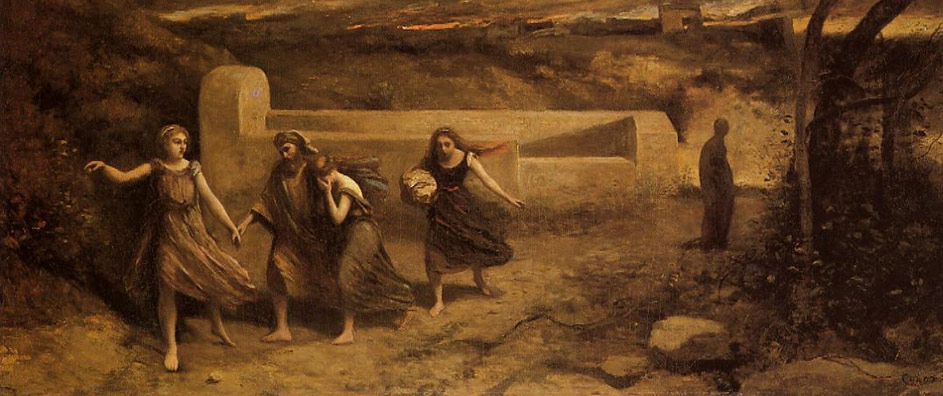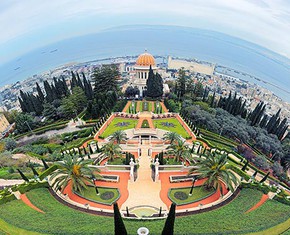The views expressed in our content reflect individual perspectives and do not represent the authoritative views of the Baha'i Faith.
By means of his argument over the destruction of Sodom and Gomorrah with the Lord, Abraham introduces a new spiritual concept to mankind: the protective power that can be generated by the choices of a single individual or by a very small group of individuals.
In Genesis, the existence of moral choice had certainly been demonstrated by Adam and Eve and their interaction with the fruit tree of the knowledge of good and evil, and by the flood associated with Noah; yet as far as can be gleaned from scripture, the positive spiritual power generated by a single individual who chooses good over evil had not yet been delineated so clearly.
With his argument, Abraham demonstrated that the ethical actions of as few as ten people might be enough to save a whole town. Previous generations knew that if the gods weren’t placated through offerings and through the intercession of priests, then famine, pestilence, war, or earthquakes might ensue; but they weren’t familiar with the notion that their own moral actions could have a powerful influence. When the Lord said, “For the sake of ten I will not destroy it,” the sacred burden of morality was placed squarely on the shoulders of each person. The most humble of individuals—a potter, a shepherd, a mother, a farmer—was assigned a spiritual value equal to that of a priest or king. Each of them now possessed a compelling reason to be obedient to the laws of God, and behave in an honorable manner. His or her actions mattered:
Man alone, by his spiritual power, has been able to free himself, to soar above the world of matter and to make it his servant.
Without the help of God man is even as the beasts that perish, but God has bestowed such wonderful power upon him that he might ever look upward, and receive, among other gifts, healing from His divine Bounty.
But alas! man is not grateful for this supreme good, but sleeps the sleep of negligence, being careless of the great mercy which God has shown towards him, turning his face away from the light and going on his way in darkness.
It is my earnest prayer, that ye be not like unto this, but rather that ye keep your faces steadfastly turned to the light, so that ye may be as lighted torches in the dark places of life. – Abdu’l-Baha, Paris Talks, p. 24.
Sodom, as it turns out, does not contain the necessary ten innocent people, a sad fact that condemns it to destruction—and transforms it into an enduring reminder of what happens when not enough people are willing to do the right things.
The test that proves Sodom’s communal guilt comes from two of Abraham’s three visitors. The two angels appear at the entrance to Sodom, where Lot welcomes them and invites them to his home so that they can wash their feet and be his guests for the night. When they accept, he prepares a feast and bakes unleavened bread.
As the meal comes to an end and the guests are preparing to retire for the night, Lot realizes that all the men of Sodom have gathered outside his house, evidently infuriated by the hospitality he has shown to the two strangers. They shout at Lot and demand that he bring the visitors out so that “we may know them.” Lot refuses, but his offer is rejected.
The mob surges forward and begins breaking down the door, but, just as all seems lost, the angels intervene by blinding the men of Sodom so that they cannot find the doorway. The angels warn Lot and his family to leave Sodom because it is going to be destroyed. Lot, his wife, and their two daughters obey, but the fiancés of Lot’s daughters laugh at the warning and are left behind. (Genesis 19:1-14).
As the family flees, fire and burning sulfur (“brimstone and fire” in some translations) rain down on Sodom, on the nearby city of Gomorrah, and on the other cities in the area, “eliminating all life—people, plants, and animals alike.” Or, as the Qur’an says, “He destroyed the overthrown Cities (of Sodom and Gomorrah), so that (ruins unknown) have covered them up.” – 53:53-4.
The precise locations of Sodom and Gomorrah are still a mystery. One possibility is that cities by that name never existed at all and, instead, the symbolic narrative given in the Book of Genesis was based on regional memories of a catastrophic event. Perhaps Abraham, Moses, and/or one of the writers of the Torah took the memories, reshaped them into a cautionary tale contrasting the good behavior expected of Israelites (represented by the hospitality of Abraham) to the rude conduct of neighboring tribes (i.e., those who were impolite to the visiting angels).
But, if Sodom and Gomorrah did exist during Abraham’s lifetime, the words of the Torah indicate that their buildings lay somewhere along the eastern side of the Dead Sea. Several places have been proposed, including Tell el-Hammam, which is currently under excavation, as well as a spot in the south basin of the Dead Sea presently covered by water. In either case, the cities were perched tenuously above an earthquake-prone area—the Dead Sea fault—that continues to be active today, and may explain their destruction.
Making the situation even more precarious were the slime pits dotting the land. Slime pits sound more gloppy than threatening, but a clearer translation of the original Hebrew word would be tar pits, puddles of asphalt, or pools of bitumen, any of which can be quite dangerous.
Asphalt is a natural component of crude oil. It is thick, dark, sticky, and—mixed with sand and stone—makes a very resilient surface for a highway. Four thousand years ago, asphalt was a valuable commodity, valuable enough to support the growth of several towns—perhaps including Sodom and Gomorrah—whose residents specialized in collecting and trading it. The trade would have generated enough profit to account for the gold and other valuables that had enticed a group of Syrian kings to make war on Sodom soon after Lot moved there.
Asphalt is not especially flammable after it has dried into a semisolid mass. But when it is still fairly liquid, before the lighter oils associated with it have evaporated, it can catch fire. So can the methane gas that sometimes bubbles up through liquid asphalt from hidden pockets in the rock below. Combine an earthquake with the explosion of a pocket or two of methane, then add drops of oil flying up into the air and catching fire before gravity brings them down, and it all adds up quite logically to the Torah’s descriptions of fire, brimstone, and mass destruction.
Abraham, camped on the higher and safer ground of Mamre, would have been no more than fifty miles away. He rose early in the morning (wakened by a tremor?) and “looked out across the plain to Sodom and Gomorrah and saw columns of smoke and fumes, as from a furnace, rising from the cities there.” – Genesis 19:28.
Next: The Symbolism of the City of Sodom
You May Also Like
Comments

















Just thought you'd like to know if ...you don't already.
Very interesting post. Thanks to you & your fellow writers for providing this wonderful service.
Sam.
We see a similar exchange reversed in the book of Jonah (verses 4:5-11), with the same affection from God in teaching his prophet, as well as the same subtle humor.